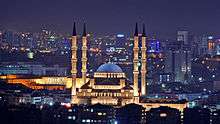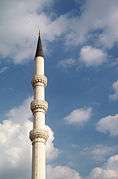Kocatepe Mosque
The Kocatepe Mosque (Turkish: Kocatepe Camii) is the largest mosque in Ankara, Turkey. It was built between 1967 and 1987 in the Kocatepe quarter in Kızılay, and its size and prominent situation have made it a landmark that can be seen from almost anywhere in central Ankara.
| Kocatepe Mosque | |
|---|---|
Kocatepe Camii ve Külliyesi | |
 View of Kocatepe Camii | |
| Religion | |
| Affiliation | Islam |
| Leadership | Imam(s): Mehmet Atıcı |
| Location | |
| Location | |
 Shown within Ankara  Kocatepe Mosque (Turkey) | |
| Administration | Turkey government |
| Geographic coordinates | 39°55′00″N 32°51′39″E |
| Architecture | |
| Type | Mosque |
| Date established | Pre-Islamic era |
| Specifications | |
| Capacity | 24,000 worshippers |
| Length | 67 m |
| Width | 64m |
| Minaret(s) | 4 |
| Minaret height | 88 m (289 ft) |
| Website | |
| www | |
History
The idea of building the Kocatepe Mosque dates back to the 1940s. On December 8, 1944, Ahmet Hamdi Akseki, the Vice-President of Turkish Religious Affairs, along with seventy-two founding members, established a society known as the "Society to Build a Mosque in Yenişehir, Ankara." In 1947 this society called for projects to be drawn up by architects, but none of the submitted projects were accepted. In 1956, through the efforts of the late Adnan Menderes, Prime Minister of the time, land was allocated for the project to build a mosque in Ankara, and a request for projects was made once again in 1957. This time thirty-six projects were evaluated, with the joint project of Vedat Dalokay and Nejat Tekelioğlu being chosen as the one to be implemented.[2]
Architecture
The accepted project was an innovative and modern design. The construction started, but due to heavy critique from conservatives for its modernist look, the construction was stopped at the foundation level. Vedat Dalokay later built a modified version of the Kocatepe Mosque after winning an international competition for the Shah Faisal Mosque in Islamabad, Pakistan in 1969. This mosque, which can accommodate 24,000 worshippers, is one of the largest mosques of the world, and accepted by many as the frontiers of modern Islamic architecture.
 Dome and Minarets
Dome and Minarets- Interior view of the central dome
 Interior view
Interior view Ankara Kocatepe Mosque interior with domes
Ankara Kocatepe Mosque interior with domes Ankara Kocatepe Mosque Interior mihrab
Ankara Kocatepe Mosque Interior mihrab Ankara Kocatepe Mosque Exterior front
Ankara Kocatepe Mosque Exterior front Kocatepe Mosque front view
Kocatepe Mosque front view Minaret
Minaret
After a third architectural competition in 1967, a more conservative or nostalgic design by Hüsrev Tayla and M. Fatin Uluengin was chosen to be built. Completed in 1987, this project is built in a neo-classical Ottoman architecture style, and is an eclectic building inspired by the Selimiye Mosque in Edirne, and the Sehzade and Sultan Ahmet mosques in Istanbul, which in turn, were influenced by the Eastern Roman architecture of the Hagia Sophia.
References
- "Location of Masjid al-Haram". Google Maps. Retrieved 2 February 2017.
- "Brochure by the Turkish Ministry of Religious Affairs" (PDF). Archived from the original (PDF) on 2008-05-28. Retrieved 2007-11-07.
- As, Imdat, "Vedat Dalokay's Unbuilt Project: A Lost Opportunity," in "The Digital Mosque: A New Paradigm in Mosque Design" Journal of Architectural Education (JAE), Volume 60, Issue 1, 2006, pp.54-66
- As, Imdat "The Kocatepe Mosque Experience, " in Emergent Design: Rethinking Contemporary Mosque Architecture in Light of Digital Technology, S.M.Arch.S. Thesis, Massachusetts Institute of Technology, Cambridge, MA, 2002. pp.24-46
External links
| Wikimedia Commons has media related to Kocatepe Mosque. |
- Images of the Kocatepe Mosque
- 3D panoramic tour of the Kocatepe Mosque
- Model photos of Vedat Dalokay's unbuilt mosque design for the Kocatepe Mosque
- Animation of Vedat Dalokay's unbuilt mosque design for the Kocatepe Mosque
- Dimensions of the Mosque can be found in the 11th paragraph of this acoustical study of the mosque

